10 Healing Foods from the Bible
Share
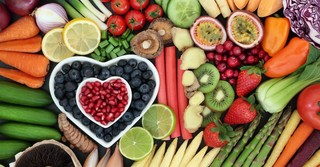
Treating our bodies as temples of the Holy Spirit includes eating naturally healthy foods. It’s not surprising that God gave us many good food choices in His Word. If you want to add to a healthy diet, here are 10 healing foods from the Bible:
Download your own personal copy of Healing Foods from the Bible HERE. Print this beautiful PDF and keep it in your kitchen or take it with you to the store to be aware of the wonderful natural healing foods we've been given by God.
Photo credit: ©GettyImages/Marilyna

1. Fish
Leviticus 11:9 TLB: “As to fish, you may eat whatever has fins and scales, whether taken from rivers or from the sea.”
Luke 5:10-11 MSG: Jesus said to Simon, “There is nothing to fear. From now on you’ll be fishing for men and women.” They pulled their boats up on the beach, left them, nets and all, and followed him.
In God’s instructions to His people in early Bible times, He specified fish from rivers or seas with fins and scales. Fish were a great food staple in Jesus’ day, and at least seven of His disciples were fishermen. On various occasions He ate fish with His disciples, and performed two miracles using a boy’s lunch of small fish and bread loaves to feed thousands of people.
According to Jordan Rubin, fish are a great source of nutrients and protein as well as healthy omega-3 fatty acids, especially those caught from cold water sources such as rivers and oceans: fish like salmon, herring, trout, mackerel, and whitefish. The American Heart Association recommends eating two servings of fish per week to include heart healthy omega-3 fatty acids into the diet.
One of my favorite ways to cook salmon is to season each piece with seafood or blackened seasoning, a little onion and garlic powder and a sprinkle of smoked paprika. Then I sauté them about three minutes per side in a small amount of olive oil and/or butter (grass-fed). A mixture of honey and spicy mustard makes a great dipping sauce.
An easy way to get the benefits of fish is without having to cook it daily is with a fish oil supplement.
Photo by Nguyen Linh on Unsplash
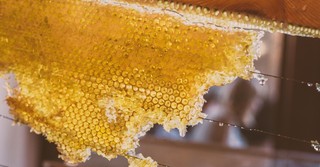
2. Raw Honey
Deuteronomy 26:9 NLT: He brought us to this place and gave us this land flowing with milk and honey!
Psalm 119:103 NIV: How sweet are your words to my taste, sweeter than honey to my mouth!
Mark 1:6 NIV: John wore clothing made of camel’s hair, with a leather belt around his waist, and he ate locusts and wild honey.
Raw honey was a valuable asset in the Bible. When God gave the Israelite people their promised land, it was called a land flowing with milk and honey—a fertile agricultural area that could produce amazing foods—including bees with raw honey. Not only was honey nutritious and filling (John the Baptist, Jesus’ cousin and prophetic forerunner, ate a diet of wild locusts and honey), it was a valued gift as well as a sweet metaphor for God’s Word.
Due to its antioxidant, antifungal, and anti-bacterial properties, raw honey is often called “liquid gold.”It’s used to help boost the immune system, soothe a sore throat or cough, soften dry skin, and even aids in healing wounds.
I often substitute raw honey for sugar in cooking (or at least part honey), and I’ve found numerous recipes online that use raw honey instead of sugar (or less sugar) for general sweetening or for healthier desserts. I’ve pinned some various kinds of recipes made with honey on my “Yummy Food Recipes” Pinterest board.
You can find several raw honeys online, including one of my favorites - 100% Raw & Unifiltered Honey .

3. Olives and Olive Oil
Deuteronomy 8:8 NLT: “It is a land of wheat and barley; of grapevines, fig trees, and pomegranates; of olive oil and honey.”
Luke 10:34 NLT: "Going over to him, the Samaritan soothed his wounds with olive oil and wine and bandaged them. Then he put the man on his own donkey and took him to an inn, where he took care of him."
Olive oil was plentiful in Bible times, due to the abundant crop of olive trees which continue to bear fruit even into old age. The Garden of Gethsemane, where Jesus prayed for God’s will to be done the night before His crucifixion, is known for its gnarled, twisted olive trees. Green olives produced the best fruit and oil. Olives made delicious side dishes pickled or in a relish. The versatile, pressed olive oil was used in baking bread as well as in a salve for wounds, softening skin, in lamps, or even as a sacred anointing oil for kings.
Jordan Rubin says that olive oil is one of the most digestible fats and helps to reduce aging of body tissues, organs, and even the brain. Others as well as Rubin believe it protects against the risks of cancer, heart disease, and can even guard against stomach ulcers. Its antioxidant and anti-inflammatory properties make olives and olive oil a valuable product for your pantry.
I still use extra-virgin olive oil in light sautés even though some say it is less effective when heated. But it makes great salad dressings. Just add 3 parts olive oil to one part of your favorite vinegar (I like flavored balsamic), and an assortment of your favorite seasonings—with a touch of honey if you need a sweetener. It will keep refrigerated for days and maybe weeks unless you use fresh seasonings. The oil will get thick, but you can heat your container in warm water, then shake for use again.
Photo by Nazar Hrabovyi on Unsplash
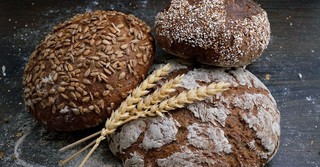
4. Sprouted Grains and Breads
Ezekiel 4:9 NIV: “Take wheat and barley, beans and lentils, millet and spelt; put them in a storage jar and use them to make bread for yourself. You are to eat it during the 390 days you lie on your side.”
In the Bible, bread appears repeatedly as the substance of life. Jesus even referred to Himself as the “Bread of Life.” The bread in Bible times used none of the modern and damaging refining methods of today. The kind of nutritious bread they served often involved the sprouting of natural grains and was a basic part of their diets.
Whole grain sourdough and sprouted-grain breads involve the soaking or fermenting of grains overnight until the seeds are partially sprouted. This process actually make these carbohydrates more easily digestible. A recent study showed that wheat sprouted for 48 hours had a higher count of amino acids, dietary fiber, and antioxidant activity. Ezekiel bread is one kind of sprouted bread that boasts of great health benefits.
You can find both pros and cons about this nutritious bread. More and more grocery stores are stocking flour made from spelt, barley, or other healthy grains. Spelt flour is one of my favorites, and while it is a heavier flour, I substitute it in recipes for all my flour needs, including pies and gravies.
Photo by Wesual Click on Unsplash

5. Goat Milk and Products
Proverbs 27:27 TLB: Then there will be lambs’ wool enough for clothing and goats’ milk enough for food for all your household after the hay is harvested, and the new crop appears, and the mountain grasses are gathered in.
Raw goat milk and cheese were plentiful in Bible times and were not pasteurized like our modern food. More easily digestible than cow’s milk, goat’s milk also has less lactose and contains multiple vitamins, enzymes, and proteins. According to Jordan Rubin, 65% of the world’s population drink goat’s milk. It can help in the treatment of inflammatory diseases, is a complete protein, and is also useful in soaps.
Photo by Nandhu Kumar on Unsplash
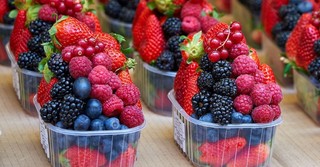
6. Fruit
1 Samuel 30:11-12 NIV: They gave him water to drink and food to eat—part of a cake of pressed figs and two cakes of raisins. He ate and was revived.
Numbers 13:23 NLT: When they came to the valley of Eshcol, they cut down a branch with a single cluster of grapes so large that it took two of them to carry it on a pole between them! They also brought back samples of the pomegranates and figs.
Throughout the Bible, small fruits like figs, grapes, and pomegranates were used widely in beverages, cakes, or eaten as fresh fruit themselves. When the two spies scoured out the land of Canaan before crossing over to the land God had promised the Israelites, they returned with clusters of grapes so large, they had to use a pole to carry them.
Pomegranates have high anti-inflammatory, antioxidant, and even anti-tumor properties. Loaded with minerals and vitamins like Vitamin A, K and E, fresh figs are also low in calories and high in fiber. Grapes contain resveratrol, a powerful antioxidant known for guarding against colon and prostate cancer as well as reducing stroke risk. They, too, are rich in vitamins and minerals and make great fresh or dried snacks.
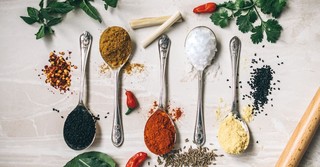
7. Spices, Seasonings, and Herbs
Exodus 30:23 NLT: “Collect choice spices—12 pounds of pure myrrh, 6 pounds of fragrant cinnamon, 6 pounds of fragrant calamus.”
Numbers 11:5 NIV: “We remember the fish we ate in Egypt at no cost—also the cucumbers, melons, leeks, onions and garlic.”
In the Old and New Testament, scores of spices were used as both food and medicines, as well as in making perfumes or incense, and were given as expensive, royal gifts. Today, cumin is a great source of minerals such as calcium, potassium, and zinc and is rich in B-complex vitamins. Cinnamon, known for its aromatic fragrance, as a spice has one of the highest antioxidant values known. Today garlic is often linked with helping heart and immune issues. Other spices of the Bible include coriander, frankincense, mint, dill, balm, aloes, myrrh, and rue. Each contained healing properties such as promoting digestion, aiding the immune system, relieving pain, or fighting infections.
Many of the biblical food spices make great additions to savory meals. In small quantities, cinnamon makes a great addition to deserts, smoothies, apple cider drinks, or even coffee.
Photo by Calum Lewis on Unsplash
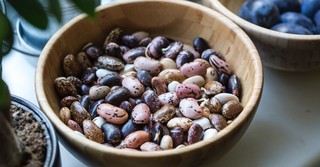
8. Beans and Lentils
2 Samuel 17:28 NIV: They also brought wheat and barley, flour and roasted grain, beans and lentils.
Beans or lentils (legumes) were served widely in the Old Testament, probably since they are such good sources of protein. This may have been a part of the red stew that Jacob prepared for his brother Esau (Genesis 25:30) as well as in Daniel’s “vegetarian” diet (Daniel 1:12-13).
Legumes are plentiful in foliate, especially important to pregnant women, are good antioxidants, and are low in saturated fats. And they make a great meatless meal with their high protein and high fiber value. Who can resist a Southern recipe of cornbread and beans? Rubin suggests soaking beans overnight in filtered water with either a tablespoon or two of whey or yogurt and a teaspoon of sea salt. This process contributes to the nutritious value of the beans or lentils.
Photo by Milada Vigerova on Unsplash
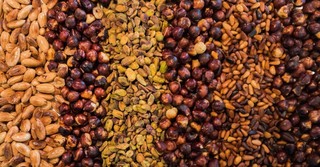
9. Nuts
Genesis 43:11 NASB: Then their father Israel said to them, "If it must be so, then do this: take some of the best products of the land in your bags, and carry down to the man as a present, a little balm and a little honey, aromatic gum and myrrh, pistachio nuts and almonds."
Pistachio and almond nuts, both found in the Bible, are low calorie snacks. Pistachio nuts are high as antioxidants and contain more lutein (1000%) than other nuts. Like grapes, they also contain resveratrol, a cancer-protection ingredient.
Almonds, mentioned several times in the Bible, are one of the highest protein and fiber nuts and contain manganese, magnesium, and calcium, necessary ingredients for the body. I keep my pantry stocked with almonds as snacks or as ingredients in salads or baking.
I love these raw almonds that are organic and steam pasturized without chemicals.
Photo by Peter Feghali on Unsplash
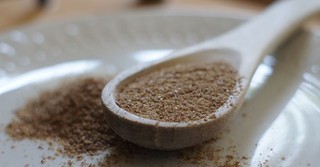
10. Flax
Proverbs 31:13 NIV: She selects wool and flax and works with eager hands.
Flax was used with linen in the Bible to make clothes. But it also had great medicinal value because of its high fiber, Omega-3 fatty acids, protein, and lignan count. It contains one of the highest plant sources of lignans, almost 800 times more than any other. These help as antioxidants, in maintaining blood sugar, cholesterol and even in cancer prevention.
I like to use ground flaxseed as a great nutrition boost in cereals, smoothies, or even in baking. Flaxseed oil, though pricey, is available in most health food stores. Here is one of my favorites - Organic Ground Flaxseed.
These are just a few of the healing foods in the Bible that offer us good eating choices. And the more we can eat “grass-fed” and organic products to protect from harmful antibiotics or pesticides, the better our foods can help to keep us healthy. When sin entered the world, disease entered too. But God in His great wisdom created the sources we needed—and the wisdom to use them the best we can to honor Him and keep our bodies healthy as temples of the Holy Spirit.
Source
Jordan Rubin, The Maker’s Diet (New York: Berkley Books, 2004).
Rebecca Barlow Jordan is an inspirational author, speaker, and passionate follower of Jesus who loves to encourage others heart to heart. She has written 11 books and over 1700 other articles, greeting cards, and other inspirational pieces. Her daily devotional Daily in Your Presence is available for delivery through Crosswalk.com. You can find out more about Rebecca at www.rebeccabarlowjordan.com.
Image by Chie Carroll from Pixabay







